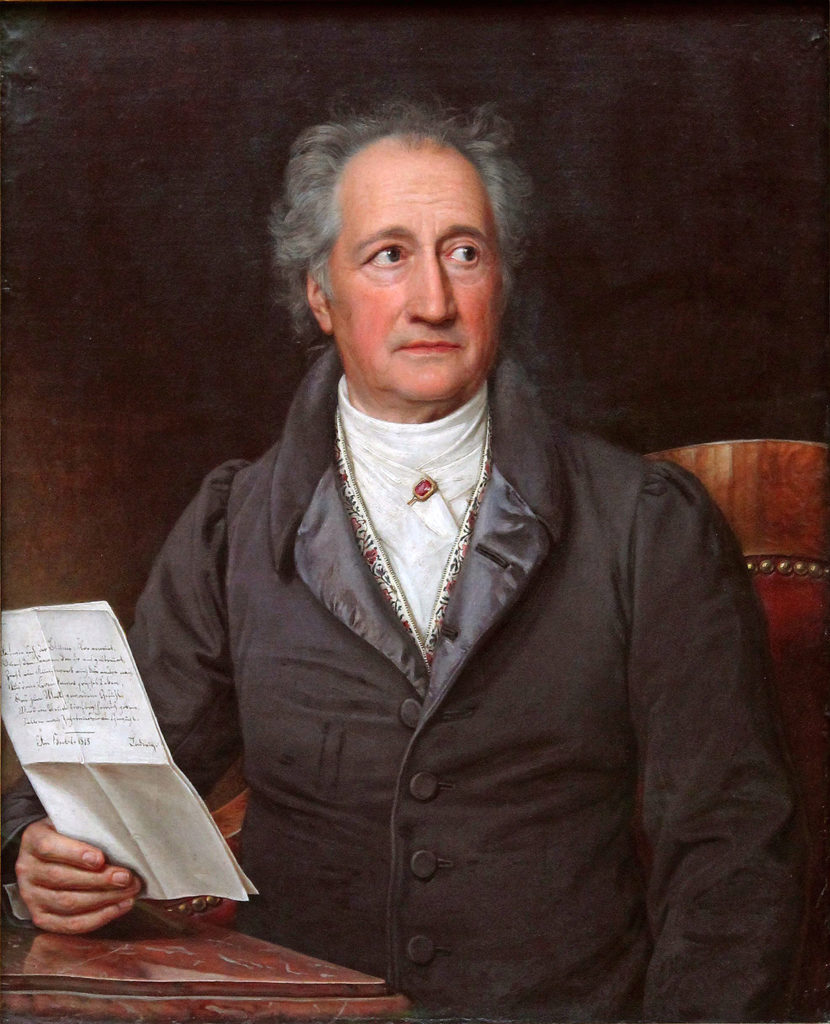
Jena 1800: The Republic of Free Spirits by Peter Neumann, translated from the German by Shelley Frisch; Farrar, Straus and Giroux, 256 pp., $27
“Perhaps there would be a birth of a whole new era of the sciences and arts,” German romantic thinker Friedrich Schlegel hoped, “if symphilosophy and sympoetry became so universal and heartful that it would no longer be extraordinary for several complementary minds to create communal works of art. One is often struck by the idea that two minds really belong together … to realize their full potential only when joined … an art of amalgamating individuals.”
By symphilosophy and sympoetry (and other “syms”), Schlegel referred to dialogues in which interlocutors achieve insights otherwise unrealizable. Several minds “amalgamated” this way in the German university town of Jena around 1800. In his new book, German journalist Peter Neumann traces their interactions, collaborations, quarrels, and reactions to the eventful age. French revolutionary ideas were spreading, as Napoleon began his conquests. Neumann’s book ends with Bonaparte’s decisive 1806 defeat of the Prussians at Jena, which French troops then looted.
As in classical Athens or 1860s Petersburg, an astonishing number of geniuses came together in Jena. Schlegel, his brother Wilhelm, Wilhelm’s wife Caroline, and Friedrich’s lover Dorothea (the daughter of author Moses Mendelsohn) formed the core group. They interacted frequently with philosophers Friedrich Schiller and Friedrich Schelling. Goethe, a minister for the Duke of Saxe-Weimar, whose jurisdiction included Jena, was doing some of his most interesting work, while poets Novalis and Friedrich Hölderlin, theologian Friedrich Schleiermacher, and philosophers Hegel and Johann Gottfried Herder also played a part in the story.
What an opportunity to explain some of the ideas that shaped the modern world! Alas, the opportunity is wasted. No one not already familiar with Fichte, Schelling, Schleiermacher, or Hegel could begin to make sense of Neumann’s brief summaries of their ideas, stated at a middle-school level in generalities that obscure the distinctive qualities of particular thinkers. “Schlegel explained why all philosophy had to be dialectical and not purely logical,” Neumann writes, but as readers anticipate clarification, Neumann immediately proceeds to another portrait of a philosopher’s digs: “Hegel found lodgings at the home of Johann Dietrich Kloppstein, who worked in the Botanical gardens and ran a small nursery.”
Neumann baffles. “The imagination was not merely a function of comprehension, as Kant and Fichte had defined it,” he explains. “It was a form of reality itself, because reality itself, in its deepest essence, was made up of contradictions.” What does it mean to say that the imagination is a form of reality, in what sense is reality made up of contradictions, and why do reality’s contradictions show that imagination is “reality itself … in its deepest essence”? Is there such a thing as shallow essence? Or: “Just as physicists had come to realize that reason understands only what it has itself fashioned according to its own design, there needed to be a realization in the field of metaphysics that our perception of things is limited to what we ourselves read into them.” This makes it sound as if physicists discover only their own projections, not anything about the world itself, and that they accept such a description of their achievements. If metaphysics can reveal only what we ourselves read into the world, who needs it?
Sometimes the problem is that Neumann’s paraphrases are less than exact, while at other times they mislead. They never allow the reader to understand the intellectual context that made one or another argument persuasive. Ideas seem like the amusing, rarefied silliness of some sweet, weird intellectuals who would make delightful figures in a situation comedy.
Neumann cites the “mediocre dramatist [August von] Kotzebue” who out of “vanity” presumed to mock the Schlegel circle in his 1799 play The Hyperborean Donkey, or Today’s Education. So far as Neumann’s account of these thinkers is concerned, Kotzebue’s mockery seems right on target: “To be or not to be—I or not-I—to Schlegel or to be Schlegeled: that is the question.”
Time and again, Neumann apparently contradicts himself. As the book begins, we are told that Wilhelm and Caroline “took a dim view of the holy sacrament of marriage” and that “they lived together more like good friends than people who had promised to be faithful to each other forever. By this point their marriage was evidently only on paper.” Then he repeatedly gives us accounts of Wilhelm’s jealousy as Caroline slips into a liaison with Schelling. Kant’s “Critique of Pure Reason … was the work of the day,” Neumann writes but on the next page, he informs us that “the book initially gathered dust in bookstore shelves.” He recounts that a republic was proclaimed when French troops entered Mainz and then, in the next sentence, calls this “a revolution from below.” “From a rhetorical standpoint, the first lecture [given by Schelling] was a catastrophe,” he begins, but soon remarks that “the audience hung on every word.” Novalis was so ill that “work was out of the question,” Neumann tells us, only to add that “sometimes he was able to write a poem.”
Breathless prose and cloying descriptions irritate. Should we credit Neumann or his translator with comments like “The union of Schelling and Hegel was regarded as the new dream team”?
Fichte, Schelling, and Hegel are notoriously difficult, and so it is especially regrettable that we come away with so little understanding of them. Readers might enjoy and learn more from Schlegel’s delightful Philosophical Fragments, a witty and profound collection of aphorisms. “German books become popular because of a famous name,” Schlegel wrote, “or because of perfect incomprehensibility, or because of many-sided dullness, or because of a constant striving toward the absolute.” Philosophy should instead capture the “irony” (Schlegel’s central concept) of the best Platonic dialogues: “In this sort of irony,” Schlegel continued, “everything should be playful and serious.” Neumann’s book is neither.


